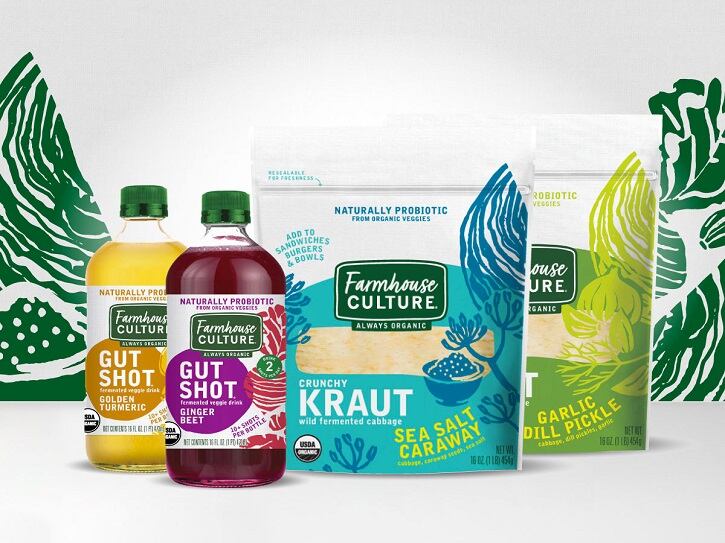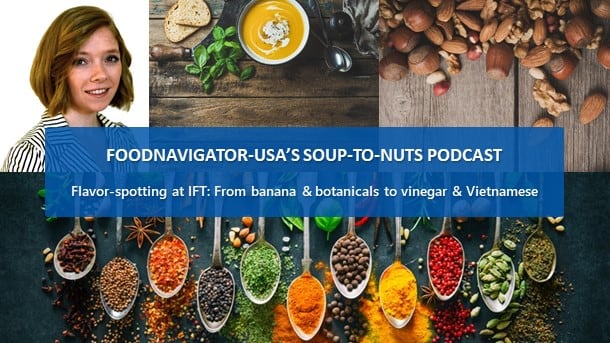The new look, which is already on some store shelves, came at the behest of the company’s new CEO Scott Lerner who told FoodNavigator-USA that when he joined the company last November it was immediately “apparent to me that we have an amazing trademark – something that is super telegraphic with consumers when you say the words ‘Farmhouse Culture,’ but it didn’t have a lot of meaning from a visual context.”
As a result, he said the company’s “never pasteurized, always organic” krauts, Gut Shot probiotics drinks and Kraut Krisp kraut-based snacks were getting lost on shelf.
“From a shoppability perspective, the current brand and packaging wasn’t working hard enough to standout due to some color schemes and some of the imagery,” which Lerner said over-emphasized function and appealed more to older consumers who are less likely to think of food as medicine than Millennials and younger generations.
Appealing to a younger shopper
After taking a “deep dive” into the brand’s positioning and identifying who its primary shopper was and its main points of difference, Farmhouse Culture decided to appeal more towards Millennials consumers with a more youthful look that played with vibrant colors, airy white space and a clean design, Lerner said.
He explained that the company wants to appeal to younger shoppers in large part because they are more likely than older consumers to look for health and wellness benefits from food, and therefore appreciate the potential health benefits of the wild probiotic strains uses to ferment Farmhouse Culture’s products.
“One of the things we found in our research is that older people are more inclined to get their probiotics from a pill whereas younger consumers are looking for probiotics through their food. So, it made a lot of sense that we were encompassing that younger consumer base … with a fresher, unique approach,” Lerner said.
For example, he noted the block print, line drawings, jewel-tones and call outs on the new packaging is more modern, than the previous packaging, which Lerner said was “geared towards” older consumers, “whether [the brand] knew it or not.”
He explained the old imagery of wood paneling and pictures of farms were “natural clichés” that many older consumers had used for decades to identify organic or natural products on looks alone.
Playing up organic
In addition to the new look, the company adopted a new tagline – “Always Organic” – to help consumers better understand the brand’s value proposition and its premium price point compared to the competition.
“Our products have always been organic and my feeling was we were not necessarily getting credit for that in the marketplace. So, a lot of consumers thought we were just a higher priced item and didn’t really understand that we were organic or the benefits of us being organic,” Lerner said.
He explained that being organic is important to Farmhouse Culture because its products are “not cooked, they are not pasteurized … they are all taken from the ground and fermented and refrigerated and given to the consumer. So, the idea that there are no pesticides, it is clean, it is just something we want to hold true to and something our founder started with.”
He added that being “Always Organic,” as the new tagline declares on the front of pack, also is a strong point of differentiation in the competitive landscape.
The packaging reinforces the brand’s commitment to being organic with the addition of a large window on the front of the pack, Lerner said.
“The previous packaging, believe it or not, had a small window on the back of the pack, which didn’t make a lot of sense. You know, you want to showcase the freshness of the product,” Lerner said, adding, “it also goes back to always being organic and being transparent with consumers. We have simple ingredient lists, you won’t find things you can’t pronounce. Obviously, we are all natural and organic, and the window kind of feeds into that as well.”
Flavor and function
The rebrand also addresses consumers’ perceptions that Farmhouse Culture’s products were “some kind of mystical gut health products,” when in reality they also are “delicious” foods that can be used in a wide variety of ways to give meals a flavorful punch, Lerner said.
“We needed to move beyond just trying to force down a functional message to consumers, and really try to help them understand what to do with these products, and specifically with the kraut,” Lerner said. “A lot of people thought or think it is a mystical health food, but in reality it is not that different from a pickle. And the way you can use it is very similar to how you would use a pickle, but the great thing is it does have a tremendous health benefit in terms of being naturally probiotic.”
With that in mind the new packaging plays up the different flavors, which Lerner says is the primary reason that most shoppers buy products.
“There are niche groups who are going to eat all the forward-thinking foods, but for us to grow, we need to access a larger consumer base and they are tasting flavor and quality first, and health benefits second,” he explained.
Overall, he said, he sees a lot of potential with the new look, which he says was a big project but hopefully worth it in the end.




